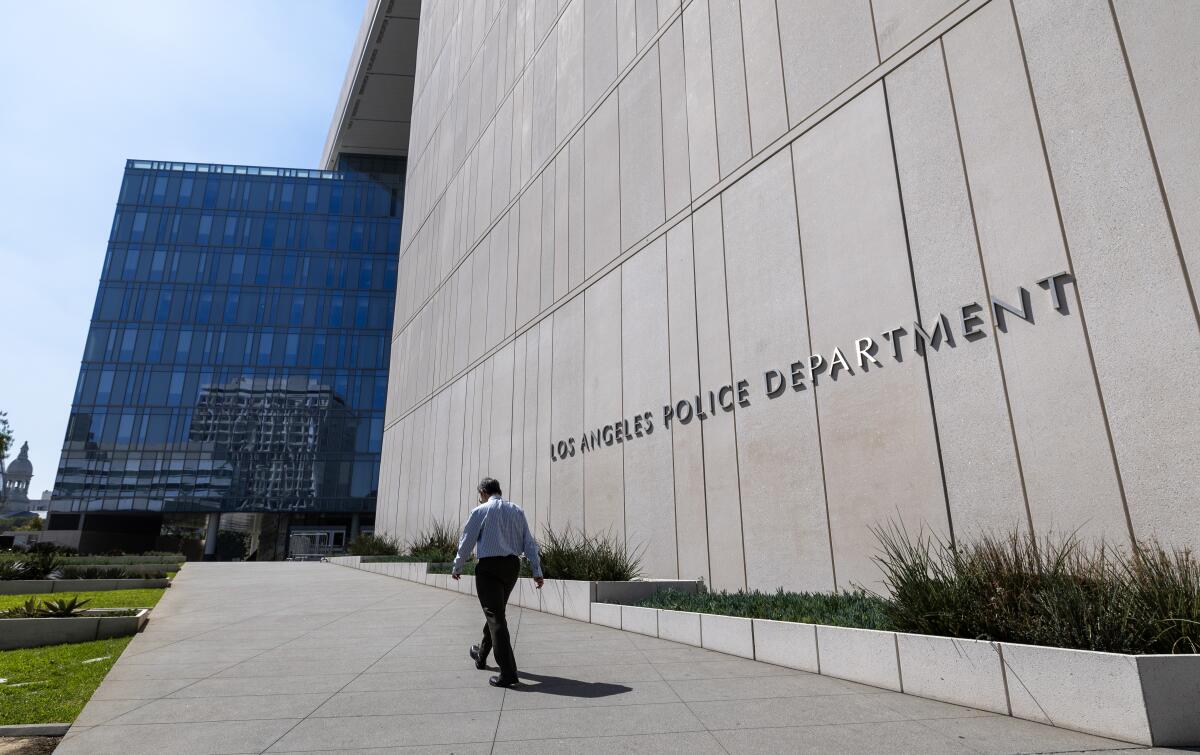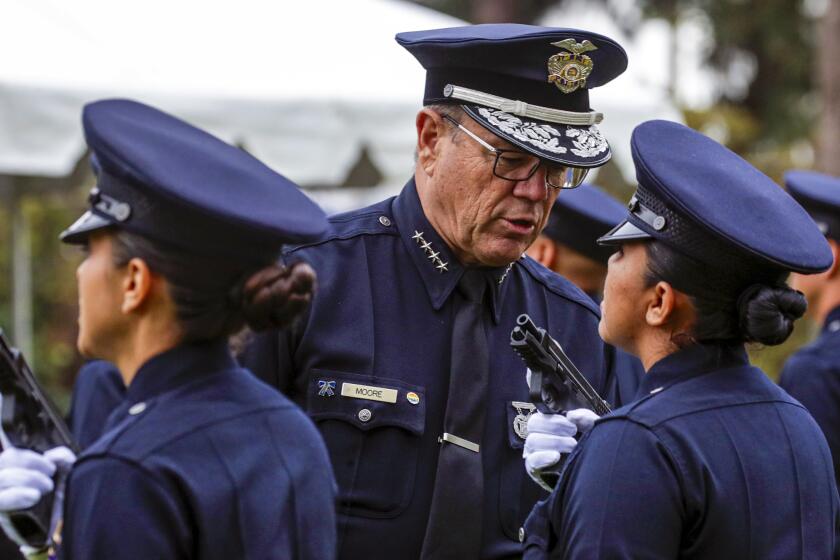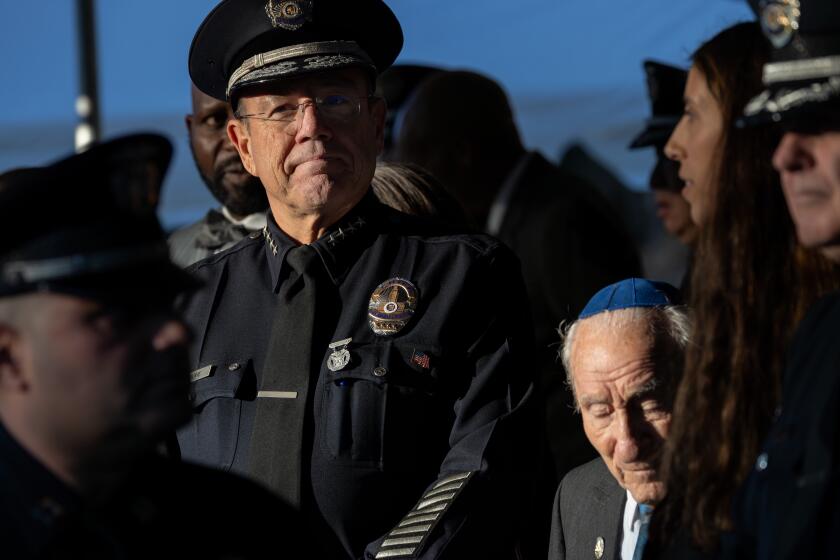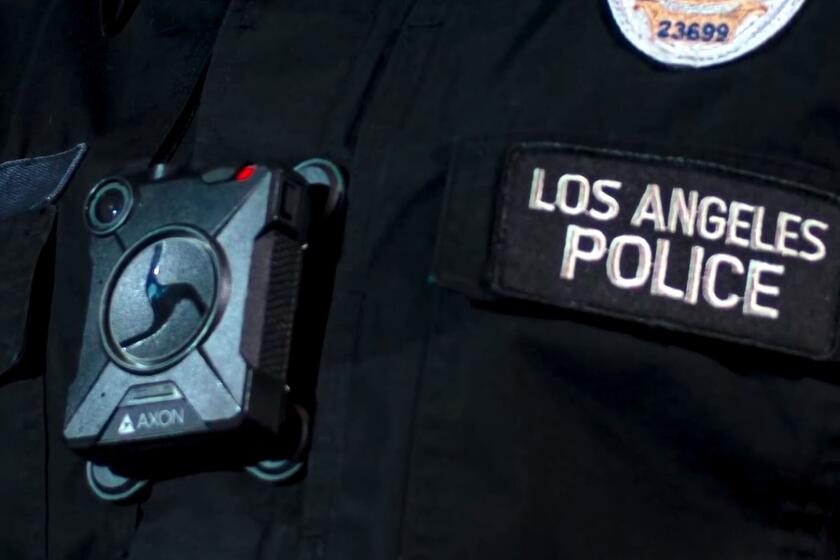After anonymous complaints, LAPD brass left wondering: Who is ‘Mel Smith’?

For months, someone has been filing anonymous complaints against senior members of the Los Angeles Police Department using the pseudonym “Mel Smith,” with allegations ranging from disputes over a coveted office at police headquarters to more serious matters such as steering contracts in exchange for bribes.
The Mel Smith files are only a fraction of the hundreds of anonymous complaints the LAPD receives against employees every year, according to Michael Rimkunas, the deputy chief in charge of the Professional Standards Bureau. There were 564 such complaints lodged between 2020 and 2022, 90 of which resulted in some “corrective action” — department-speak for a verbal reprimand, suspension or other discipline.
But because of the uniquely detailed and specific nature of the claims, Mel Smith’s identity has been a matter of intense speculation among the department’s upper echelons for months, with some suspecting a high-level insider is responsible.
Police discipline matters are typically shielded from public view under state law, and it’s unclear whether the tipster’s complaints have been found to be baseless or credible.
One Mel Smith complaint singled out Deputy Chief John McMahon, who runs the Information Technology Bureau. The complaint accused McMahon of maneuvering to get a corner office with windows at police headquarters, and distributing to his staff Apple Watches that the department sometimes issues to high-ranking officials. It also alleged that he received kickbacks as “some sort of underground consultant” for AT&T, after the department switched to the telecommunications giant after years with Verizon, McMahon says. He strongly denied all the charges.
“Another allegation was that, ‘He comes and goes at work all the time, check his time card,’ ” McMahon said in an interview with The Times, adding that the complaint was investigated and determined to be without merit. “I think it’s somebody that’s extremely petty, insecure and is destructive to the organization’s mission to accomplish its objectives.”
A commander has also been among those singled out by Mel Smith, according to multiple department sources who requested anonymity in order to discuss the internal matter. One source familiar with the claims said they appear to be from an “internal malcontent that is not getting their way.” The person said Mel Smith is exploiting the department’s complaint system, which allows anyone to remain anonymous while making “petty” allegations against a colleague. All of the claims are investigated — at the expense of taxpayers, the source said.
So far, theories about Mel Smith’s identity have focused on one of a handful of high-ranking civilian or sworn employees, or someone with access to them.
A string of recent controversies have put to a test LAPD Chief Michel Moore’s quest to get his department into shape before stepping down in the next year or two.
Defenders of the system say it allows officials to call out wrongdoing in the workplace without fear of retaliation.
There is no internal investigation that aims to unmask whoever is behind the Mel Smith alias, sources said, and even if that person were identified, they would probably be shielded by whistleblower protections.
Rimkunas said the department doesn’t release “statistics on the number of complaints from a specific complainant.” And, to ensure the complaint system remains fair and transparent, he said, “we usually don’t like to try to identify people.”
“Maybe there is even a Mel Smith, I don’t know,” he said. “If folks have concerns about the work of LAPD, we need to try to treat them seriously and investigate them.”
The department receives hundreds of complaints per year from unnamed people, some of whom fear retaliation for calling out alleged wrongdoing. In one high-profile example, a detective earlier this year anonymously reported allegations of sexual abuse involving members of the Centurions football team by off-duty police officers.
At the same time, Rimkunas said, there are “many reasons why people wanna use IA [internal affairs] — we call it weaponizing — to bring information out.”
In numerous lawsuits and legal claims against the city by officers, officers have alleged being targeted with petty complaints by colleagues. In one suit winding through the courts, a former internal affairs investigator, Hamilton Alvarenga, alleged that he faced retaliation after he noted “multiple irregularities” in a personnel complaint made against a captain in the Transit Services Division. That complaint was filed after the captain accused two higher-ups of misappropriating funds, Alvarenga’s suit says. But when Alvarenga noted some of those discrepancies, he was told to stop looking into matters that weren’t related to the case, and he was later transferred, the suit says. The city has denied the general allegations made in the suit.
In another example, Sgt. Darcy French accused department leadership of “initiating several frivolous complaints” against her after she reported her colleagues for sharing sexist memes and became the target of an online harassment campaign.
Prosecutors begin review of over 300 cases identified as potentially compromised amid LAPD gang unit scandal, according to multiple law enforcement sources.
Other legal actions have described a culture of officers seeking a payday by filing unfounded lawsuits against the city — the “LAPD lottery” as it’s referred to inside the department. Some say officers allege misconduct by colleagues as a form of retaliation or to get ahead of complaints against themselves. In a recent deposition in one such lawsuit, an LAPD supervisor said that some officers seek to “pad” their lawsuits by filing complaints, “trying to create an environment or an issue or create evidence that doesn’t exist.” The city has denied the allegations.
The complaint system “has been abused by people, sometimes to file lawsuits and all that, but also it has been abused by command staff to get rid of people,” said Mario Munoz, a former lieutenant who worked in internal affairs for 10 years. Complaint investigations can range from several days — in cases with compelling evidence, such as a video — to a year, Munoz said, adding that cases such as the Mission gang scandal in which officers are accused of criminal behavior can stretch beyond that time frame.
“A lot of times, some of these complaints can be fabricated to help a lawsuit, but a lot of times an anonymous complaint can be made because there’s information that is known, but they don’t want to know where a source comes from,” said Munoz, who oversaw several sections within internal affairs, including the workplace investigation unit. “That’s the only time the department is going to investigate, if it’s something that’s credible number one or it’s something that can be verified. For example, Captain So-and-So is using marijuana, and he keeps it on his desk or where have you. So now, the department has an obligation to investigate.”
The LAPD’s disciplinary system has long drawn scorn from critics, particularly after years passed in which the department failed to uphold complaints of biased policing by its officers.
Reform activists have for years decried the system, saying such outcomes raise serious questions about how seriously the LAPD takes complaints of bias by its officers. Numerous studies have shown that Latino and Black residents have been disproportionately affected by certain enforcement tactics in recent years, including vehicle and pedestrian stops.
Under the current system, both external and internal complaints are routed through the Professional Standards Bureau, which investigates each allegation by “gathering available evidence and interviewing parties, including the complainant, subject officer(s) and any witnesses,” according to the website of the Office of the Inspector General, which oversees such investigations.
The Los Angeles Police Department is considering changing department policy to increase random reviews of body camera recordings.
“If misconduct is ... found, the complaint goes up the chain of command, with recommendations for discipline, to the chief. If complainant disagrees, OIG can conduct a case review,” the office says on its site.
Even when complaints are substantiated, they rarely result in discipline against the accused officer.
One reason, department observers say, is that officers are increasingly having their disciplinary hearings before all-civilian panels, who routinely hand down more lenient punishments than those recommended by LAPD Chief Michel Moore. Civilian oversight boards have voted for a lesser penalty in about 68% of cases between 2019 and 2021 in which Moore recommended firing an officer, a report released by the inspector general last year found. Traditional panels made up of one civilian and two LAPD command staff members did so about half the time.
Under the LAPD’s discipline system, the chief does not have the power to fire an officer. When the chief believes firing is necessary, the officer is entitled to a hearing before a three-person panel, called a board of rights. The hearings are mini-trials in which the officer and department officials present evidence and call witnesses. An officer can also request a board hearing to challenge a suspension or demotion issued by the chief.
Until 2019, the panels consisted of one civilian and two LAPD officers with the rank of captain or higher; but with the passage of Measure C that year, officers could opt to have their cases heard by an all-civilian board.
In recent years, the vast majority of officers facing serious discipline have opted for hearings in front of all-civilian panels.
Moore has joined city leaders including Mayor Karen Bass and Councilmembers Hugo Soto-Martínez and Tim McOsker, who have called for a change to Measure C, which gave officers the option of all-civilian disciplinary hearings.
This has faced strong opposition from the union representing rank-and-file officers, who have long argued that the traditional panels were unfair because the LAPD officials serving on them had an interest in supporting their boss, the chief of police.
More to Read
Sign up for Essential California
The most important California stories and recommendations in your inbox every morning.
You may occasionally receive promotional content from the Los Angeles Times.














